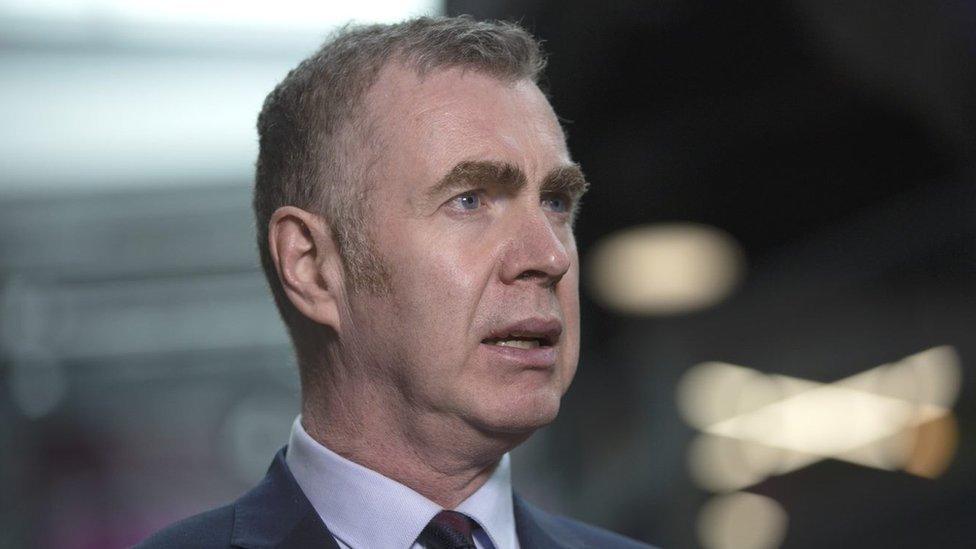Welsh election: Plaid promises 'seamless' health and social care
- Published

Adam Price said he has "seen with his own eyes" the struggle that many families face as his mother cares for his father, who has dementia
Plaid Cymru has said it will form a commission to find ways to fund the creation of a "seamless" health and social care service if it wins the Senedd election.
It said it wants care to be free at the point of need.
The party has also pledged a £10 per hour minimum wage to all care workers.
Labour accused Plaid of offering "false hope", while the Conservatives said they would also establish a commission on social care funding.
The Liberal Democrats said they would work towards the creation of a single national care service.

WALES ALERTS: Get extra updates on BBC election coverage

Mr Price said that his mother cares for his father, who has dementia, and that he had "seen with his own eyes" the struggle that many families faced.
"A new National Health and Care Service would ensure the seamless integration of delivery on a local level, bringing together local government and health boards in new regional care partnerships," Mr Price said.
"Care assessment processes should and would focus on identifying personal care need, rather than the arbitrary definitions of 'health' or 'social' care."
Mr Price said a Plaid Cymru government would also increase the number of district nurses.

WALES ELECTION: THE BASICS
What's happening? On 6 May, people will vote to elect 60 Members of the Senedd (MSs). The party that can command the support of a majority of MSs will form the Welsh government. Find out more here.
What powers does the Senedd have? MSs pass laws on aspects of life in Wales such as health, education and transport - and have some tax powers.
Who can vote? Anyone who lives in Wales, is registered to vote and aged 16 or over on 6 May is eligible. You can register to vote online, external.

He said the commission would report within a year and consider Plaid Cymru's preferred option of using general taxation and a social care levy, backed by economist Professor Gerald Holtham in 2018.
Prof Holtham said an income tax increase of between 1-3% could be used to fund elderly social care in Wales.
He said the tax would need to vary depending on age and income to insure fairness and initially it could mean people in their fifties would pay four times more than those in their twenties.

What are other parties saying?
A Labour spokesperson said: "For something as important as social care, people deserve hope, not more false hope from Plaid and continued failure from the Tories.
"Welsh Labour's credible plan for social care means that we can deliver the Real Living Wage for all social care workers in the new term and help people keep more of their money before they pay for care with the most generous offer in the UK."
The party said there needed to be a "long-term sustainable UK solution so that care is free for all at the point of need".
"If the UK Tory government fails to bring forward a fully funded scheme within the current UK Parliament, we will consult on a Wales-only solution to meet our long-term care needs," the party said.

Leaders debate: If you would like to be part of the virtual audience for the BBC Wales Election 2021 Leaders Debate on 29 April please use this form to get in touch.

Labour leader Sir Keir Starmer said: "Mark Drakeford and Welsh Labour have got a [social care] plan, a workable plan, for the short term, but in the long term we do need the Westminster government to publish the plan that it has been promising for a decade."
The Welsh Liberal Democrats also said they would work towards the creation of a single National Care Service and the integration of health care.
A spokesperson said: "We plan to implement wide-ranging changes to commissioning, giving more power to local commissioners, and to people themselves to source their own services to find the care that best meets their needs.
"In the short term we will continue to drive the joint commissioning of services by local health boards and local authorities."
The Conservatives said they would also introduce a commission to consider long term sustainable funding solutions for social care and a minimum wage of £10 per hour for care workers.
They would not introduce a social care tax but would appoint a chief social care officer for Wales.
A spokesperson said: "Welsh Conservatives will increase the capital limit to £100,000 for those accessing residential care to ensure that people do not lose their life savings to care costs and establish a £15 million care innovation fund to promote joint-working between the NHS and social service departments."
How do we pay for social care now?
At the moment local authorities carry out financial assessments to determine how much to charge for social care - everyone has a right to have their needs assessed.
Once an assessment has been made, you can either receive council-commissioned services or pick your own services, paid for by direct payments, to you or a relative, from the council.
Non-residential care
If you are cared for in your own home, the most you'll have to pay is £100 a week.
If you do not have a high level of disposable income and you don't have savings and investments over £24,000 (not including the value of your home) you may pay less.
In deciding charges, councils must allow you to keep enough to meet your daily living costs.
Residential care (care or nursing homes)
People with assets of more than £50,000 (including the value of your home if no-one is living there) pay the full cost of care in a home. But if you do not have that much money then you can receive financial help depending on your income.
People who need an element of nursing care for a "health need" can get a contribution from the NHS towards their costs.
Other individuals with complex primary healthcare needs, rather than a residential requirement, can be eligible for all their fees being paid by the NHS under a scheme called Continuing Healthcare.
Councils must ensure you are left with at least £33 a week to spend on personal items.

POLICY GUIDE: Who should I vote for?
FIRST TIME: Will 16-year-olds vote?

- Published15 April 2021

- Published7 April 2021

- Published1 April 2021

